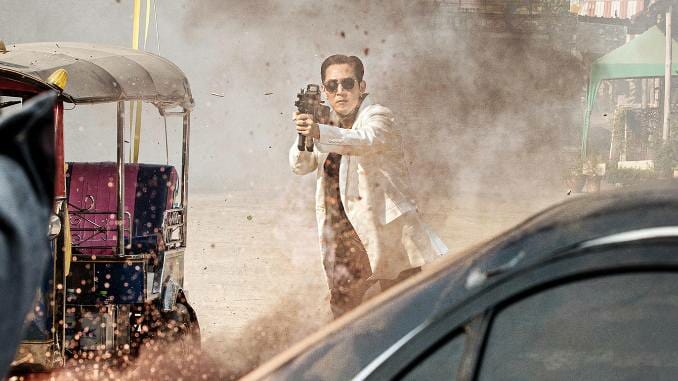Sharp, Sweaty Craftsmanship Heightens Derivative Hitman Thriller Deliver Us From Evil

You’ve probably seen a movie like Deliver Us From Evil. The second feature helmed by Hong Won-Chan (who also wrote the script), this Korean action-thriller is a revenge story about a killer with a heart of tarnished gold, risking it all for an innocent. Like many hitman movies, it’s about the ultimate tragedy of someone realizing they want to get out of a murderous lifestyle but can’t—and that their lifetime spent killing will always be reflected back upon them. Thankfully, though this is the kind of premise that Liam Neeson, Nicolas Cage or countless other actors have churned out as a paycheck-cashing B-movie, Hong’s garnishing of his realism with savvy style and a game villain bolsters the lack of novelty with quality. Deliver Us From Evil’s sweaty thrills might be derivative, but they’re far from dead on arrival.
In-nam (Hwang Jung-min), a clenched jaw of a hitman, has just finished his requisite One Last Job, and is—as nature dictates—immediately Pulled Back In. His ex-girlfriend, whom he had to leave when he first started up in this underworld gig, needs his help. Her young daughter has been kidnapped and In-nam is just enough of a softy for this situation to attract his ire. Bad news for the kidnappers, but also bad news for In-nam, whose last job attracted some ire of its own from a vengeful yakuza known as The Butcher (Lee Jung-jae).
The ensuing, cascading pursuits hop between languages and locales (Thai, Korean and English are spoken depending on who’s shaking down whom), all with a straightforward brutality that attests to Hong’s skillfully frank scripting, eventually converging in Bangkok. Here, In-nam meets Yui (Park Jeong-min), a transgender comic relief character who’s lending a hand for enough cash to afford surgery. Her over-the-top schtick is initially tired and regressive, but she also lends some much-needed emotion to the otherwise hyper-macho ensemble. She’s an imperfect character that I wish was never played for laughs (or at least had those laughs not be always partially at her expense) and was never played by the cisgender actor Park, but I was pleasantly surprised that the writing eventually veered towards depicting her detractors as scummy and her reactions as realistic rather than melodramatic.
While Park earned the most critical praise in Korea—showing that this kind of casting attracts similar awards attention outside of Hollywood—it’s Lee who’s the real standout of the cast. He’s perfectly pitched: Fun and scary, embodying and adding nuance to his prototypically garish and serpentine gangster executioner. His styling is great (massive shades, florals and ostentatious topcoats compliment neck tattoos and scars), but his restraint when teasing out The Butcher’s unhinged and unrelenting nature is better. Hong lets him be cool too: Lee kicks a metal pan underneath a soon-to-be-bled victim, hanging from the ceiling, with an engrossing and terrifying nonchalance.
-

-

-

-

-

-

-

-

-

-

-

-

-

-

-

-

-

-

-

-

-

-

-

-

-

-

-

-

-

-

-

-

-

-

-

-

-

-

-

-








































